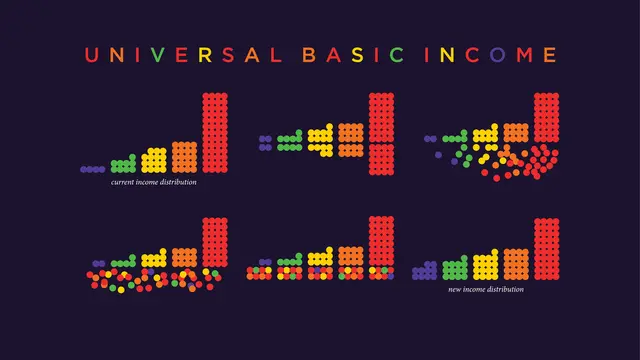
May 02, 2023 • UBI
Universal Basic Income: Comparing the Cost of the Current Welfare System and UBI
Unraveling the Myths and Realities of UBI's Economic Impact

As an economics writer and personal finance aficionado, I spend my days crunching numbers, deciphering tax codes, and collecting fascinating anecdotes about the world of money. While some folks may collect stamps or vintage wine, I collect economic policies. And today, my fellow dismal scientists, I present to you a dour examination of the ever-so-buzzy Universal Basic Income (UBI).
Picture this: it's Friday night, and you're at a dinner party. The conversation turns to the latest economic policy ideas. You're eager to chime in, but you suddenly realize you have no idea what UBI is. Fear not, for I am here to save your social reputation with a somber look at the basics of Universal Basic Income.
UBI, in a nutshell, is the idea of giving everyone in a society a regular, unconditional cash payment, no strings attached. Imagine waking up to find an extra $1,000 in your bank account every month, courtesy of Uncle Sam. It's like winning the lottery, except it's not really winning, and you can't escape the tax man.
Proponents of UBI argue that it could reduce poverty, improve social mobility, and even increase entrepreneurship by providing a financial safety net for all citizens. Detractors, on the other hand, worry about the potential for inflation, disincentivizing work, and the overall cost of implementing such a program.
But how would we pay for such a generous gift from the government? Taxes, of course! My heart swells with joy at the thought of new and creative ways to tax the masses. One proposal suggests implementing a value-added tax (VAT) on goods and services. This consumption tax would generate revenue for the UBI, but might have you thinking twice before splurging on that extra avocado toast.
As I delve deeper into the realm of dollars and cents, let's compare the cost of the current welfare system with the cost of implementing a Universal Basic Income. Like an overpriced cup of artisanal coffee, the numbers may leave a bitter taste in your mouth, but it's important to examine them nonetheless.
Currently, the United States spends approximately $1 trillion per year on various welfare programs. This includes support programs such as Social Security, food assistance, housing assistance, and unemployment insurance. The labyrinthine nature of these programs creates significant administrative costs, as thousands of government employees toil away to ensure that benefits are distributed properly. It's the kind of bureaucracy that brings a tear to an economist's eye.
Now, let's turn our attention to the cost of implementing a UBI. For the sake of simplicity, let's assume that every adult in the United States receives $1,000 per month, or $12,000 per year. With approximately 250 million adults in the country, this would amount to a staggering $3 trillion per year. Cue the ominous music.
But wait, you might say, what about the savings from streamlining existing welfare programs? Ah, a valid point! Let's take a closer look at those numbers. It is estimated that, by replacing existing welfare programs with a UBI, the United States could potentially save around $500 billion in administrative costs. However, even with these savings, the cost of implementing a UBI would still be significantly higher than the current welfare system, at around $2.5 trillion per year.
While the exact figures may vary depending on the specific UBI proposal and the extent to which existing welfare programs are eliminated or reduced, it is clear that implementing a UBI would come with a hefty price tag. As the age-old adage goes, there's no such thing as a free lunch—or, in this case, a free monthly stipend.
While the idea of a Universal Basic Income may be tantalizing to some, the significant costs associated with implementing such a program cannot be ignored. Even after accounting for potential administrative savings, the price of UBI would dwarf that of our current welfare system. Like a costly souvenir from a regrettable vacation, it's a sobering reminder that sometimes, the best things in life aren't free.
In conclusion, Universal Basic Income is a fascinating, albeit contentious, policy proposal that has both ardent supporters and skeptical critics. While it offers the potential to reduce poverty and streamline welfare programs, it also raises concerns about inflation, work disincentives, and the overall feasibility of funding such a program. So, the next time you find yourself at a dinner party discussing UBI, you can regale your companions with tales of taxes and bureaucracy.




